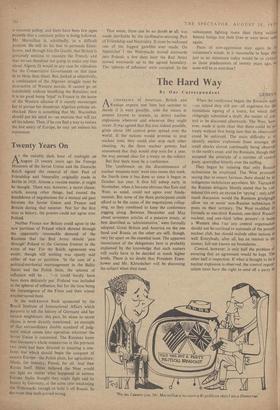Twenty Years On
Athe suitably dark hour of midnight on August 23 twenty years ago the Foreign Ministers of the Soviet Union and the Deutsche Reich signed the renewal of their Pact of Friendship and Neutrality originally made in Berlin in 1926. Almost a routine matter, it might be thought. There was, however, a secret clause; which, among other things, had caused the breakdown of negotiations for a mutual aid pact between the Soviet Union and France and Britain during, that summer. Not for the first time in history, the powers could not agree over Poland.
Neither France nor Britain could agree to the new partition of Poland which showed through the apparently reasonable demand of the Russians that the Red Army should 'pass through' Poland to the German frontier in the event of war. For the Reich, agreement was easier, though still nothing was openly said either of war or partition. 'In the case of a political-territorial rearrangement in the Baltic States and the Polish State, the spheres of influence will be . . .'—it could hardly have been more delicately put. Finland was included in the spheres of influence, but for the time being the intransigence of the Finns and their winter weather saved them.
In the well-known book sponsored by the Royal Institute of International Affairs which purports to tell the history of Germany and her eastern neighbours, this pact, let alone its secret clause, is never directly mentioned: an example of that extraordinary double standard of judg- ment which comes into operation wherever the Soviet Union is concerned. The Russians knew that Germany's whole manoeuvres in the previous two years had been directed to ensuring a one- front war which should begin the conquest of eastern Europe--the Polish plain, for agriculture; Silesia, for industry; Ploesti, for oil. And then Russia itself. Hitler believed the West would not tight no matter what happened in eastern Europe. Stalin thought they might fight and he beaten by Germany, at the same time weakening the Wehrmacht enough to hold it off Russia. In the event they both proved wrong. That event, there can be no doubt at all, was made inevitable by the inoffensive-seeming Pact of Friendship and Neutrality. It must be reckoned one of the biggest gambles ever made. On September 1 the Wehrmacht moved eastwards into Poland; a few days later the Red Army moved westwards up to the agreed boundary. The 'spheres of influence' were occupied. In the
subsequent fighting more than thirty milli human beings lost their lives or were never see again.
Pacts of non-aggression may again be statesmen's minds. Is it reasonable to hope that just as no statesman today would be so cynical, as those predecessors of twenty years ago, se none will be as mistaken?














































 Previous page
Previous page